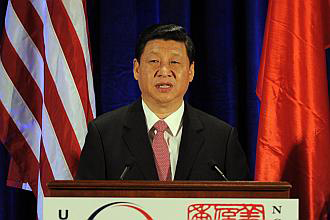The speech that China Vice President Xi Jinping delivered to an audience of mostly corporate executives after Wednesday lunch in Washington DC was written off as polite platitudes by US media. But the man delivering it and its tone presage substantive improvements in the bread-and-butter issues that define US-China relations for most Americans.
Xi’s characterization of ties between the two nations as an “unstoppable river that keeps surging ahead” is true on its face. As the world’s two biggest economies — as well as the two nations best able to project political influence abroad — US and China know that the tone of their relationship is what the other nations of the world use as the primary gauge of global stability.
Moving forward, as China’s next leader, Xi knows better than most Americans that, given the state of China’s development, its best interests now lie in gradually acceding to the changes that Americans have been clamoring for — albeit somewhat prematurely — during most of the preceding quarter century.
Foremost among them is balanced trade. China continues to export nearly three times as much to the US as it imports, but Xi knows that the ratio is changing, slowly but steadily. It must change for the simple reason that China must import more, much more, to satisfy the surging demands of its consumers for meat, grain, natural resources, luxury goods, entertainment, software, cars, gadgetry — virtually everything America wants to export. Add to that the swelling tide of Chinese heading overseas for tourism, higher educations, second homes and investment opportunities, and China is on course to balance the two-way flow of foreign exchange by the end of the decade.
And as the balance of trade shifts, it will be in China’s self-interest to let the yuan appreciate as much as any American businessman could want — maybe more than would be optimal for the hundreds of thousands of American businesses that rely on cheap but efficient Chinese manufacturing for its profits. Just as the yen — which had been a weakling during the three decades it took Japan to pick itself up from the ashes of defeat — has surged to obscene levels against the dollar — to the benefit of no one, least of all the US — the yuan will be in danger of doing the same by the end of the decade as everyone wants a bigger piece of what by then will be the world’s biggest economy by a wide margin.
“It is a course that cannot be stopped or reversed,” Xi added, referring to the swelling of that deep river of good relations.
Well, yes and no. The river can be stopped, rather abruptly and violently, if demagogues in the US grab more power and decide that China’s rise is somehow inimical to US interests. That is the eventuality China fears more than anything. That is the awful possibility that Xi Jinping wants to do everything in his still limited power to prevent. The only way he can do that at the moment is by putting a warm human face on China’s intentions.
Xi knows — as does Barack Obama — that notwithstanding the Linsanity overtaking the land, Americans remain at heart a xenophobic people. Its proverbial open arms to the huddled masses is nice imagery but the reality has been different as most educated Asian Americans (or Americans of any ethnicity) can attest. The many anti-Asian immigration acts over the past century and a half merely hint as the degree of threat Americans feel at the possibility of an ascendant Asia.
China is coming to represent that threat in the minds of the more xenophobic half of Americans. For such people a China whose economy is bigger and more influential than that of the US is the ultimate nightmare. Yet, as most rational people understand, China must become several times the size of the US in economic terms before its people will be able to enjoy something akin to the standard of living enjoyed by people in nations like Japan, Taiwan, S. Korea and western Europe.
The one nation that can derail China’s progress toward that happy day is the United States. If it becomes fearful of China’s continued rise, the US can start a trade war or even a shooting war and send the global economy into a tailspin. Not only would it derail China’s growth, it could set off enough unrest in China to lead to the overthrow of its Communist regime. Some Americans would see that as a welcome scenario. In fact, it would be a calamity for the global economy. A destabilized China would become an economic black hole that would cost US companies hundreds of billions in lost investments and growth opportunities and generate enough uncertainty to set the global economy — including that of the US — shrinking for years, maybe decades.
And that’s why Xi Jinping is doing everything in his power to show his warm and human face to America. His second visit to the tiny Iowa town of Muscatine is meant to show that he has fond memories of the warmth and good will that ordinary Americans showed a young, low-level Chinese official way back in 1985 when China was a global charity case. Fortunately, for both China and the US Xi is a personable man with a gift for projecting sincere warmth and candor. Those qualities will be put to even better use when he becomes China’s new leader early next year.

